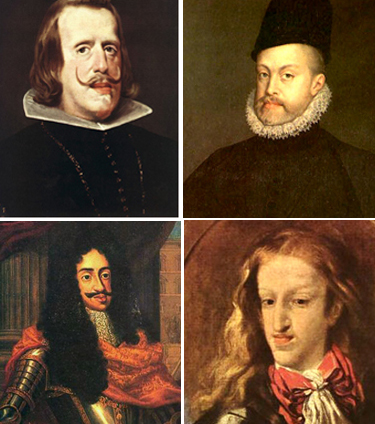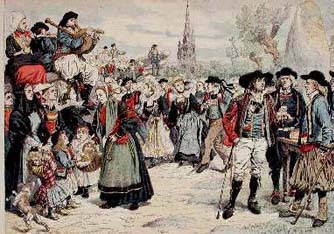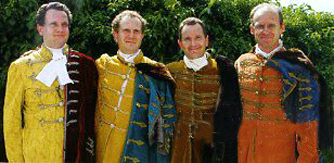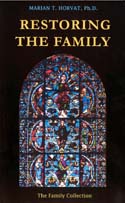 |
Organic Society
Clans and Human Types
Plinio Corrêa de Oliveira
A large family with 5, 8 or 10 children can form a defined human type. It is not rare for family members to have the same form of head, nose, eyes and chin, the same way of walking and making gestures, and a strong tendency to follow the same moral behavior. When we compare many families, we see what each family has in common and what makes the members of each family different from the others.

The House of Habsburg has its typical characteristics of a prominent jaw and lower lip. Clockwise from the top: Philip IV of Spain, Philip II, Charles II and Emperor Leopold I of Austria |
The same can be said for a clan, a group made up either by extensions of the same family or by different families. When we compare a clan from one region with clans of other regions, we notice that it has certain similar traits that distinguish it from the clans of other regions. There will be physical likenesses when the bonds of blood are close; otherwise there will be similarities in the ways of talking, behaving and facing life.
If we go one step further, we no longer have the region of a clan, but rather what is called an area of civilization, an expression I like. It means an area dominated by specific uniform cultural aspects. It produces a more generic human type proper to the cultural, geographical and climatic attributes of that larger locale. In Spain, for example, the regional types are strongly defined, so that a Spaniard from Andalusia is very different from a Catalonian or a Spaniard from the Basque Province, even though all have some common traits making them different from their neighbors, for example, the French or Portuguese.
Each man is an individual with his own traits. But he also has some things in common with his brothers, with the members of his clan, with the persons in his region, and finally with the people of his nation. These affinities and differences of human types and psychologies should not produce friction and fighting. When people are raised under the influence of Holy Mother Church and follow the four cardinal virtues, one family will not clash with other clan members, just as the clan will not clash with the region, and so on up the line. The family lives from the strength of the individuals who compose it, just as the clan lives from the strength of the families, the region from the clans, and the nation from the regions. A healthy development of clans does not produce clashes. The latter appear when the process becomes unhealthy.
Through the instinct of sociability, the natural order establishes that man will tend toward having relations with others. Doing this, he does not harm his personality, but actually becomes more himself. A man grows by at times analyzing himself, and at other times by comparing himself with others and noting the legitimate differences that exist, and admiring such differences. This double movement – centripetal and centrifugal – is proper to the human being and also to every movement of society tending toward perfection.
What would be a disease in the life or development of the clans?
Disease in the development of clans and society
We can say that at a certain point in the 13th century, the entire medieval order was attacked by a disease. The point of unity of all Catholic virtues was broken. From this moment on, the virtues still subsisted, but like the remains of a wrecked vessel or the life boats of a sunken ship. Catholic virtue lost its former cohesion. As consequences, the entire social structure broke and the old Christendom began to deteriorate.

The people of the region of Britanny, France, have a distinctive way of being and celebrating together.
Below, Hungarian nobles at a wedding in France

|
It seems that an immense sin was committed. We can surmise that a man with a high vocation, another St. Francis of Assisi or St. Dominic of Gusman, did not correspond to his vocation. We can discern that a religious order called to see, judge and counter-attack the nascent Revolution was missing at that time. The Revolution started, and no one was there to counter-attack it specifically. Now then, Divine Providence always gives the appropriate means to assist the needs of the Church and Christendom. So, we believe that a man was called to do this work and did not correspond to his vocation. In History, no one knows who this man was. What is known is that after the beginning of the Revolution, Christendom entered into a great and irreversible decline.
One of the first steps of the Revolution was to spread the movement of troubadours who introduced courtly love, a false notion of love. When a person opens his soul to sensuality and sentimentality, he becomes insensible to the attractions of the life in the clans and to family life.
Indeed, a spirit that adheres to sentimentality necessarily dreams of relations of love that can only exist between imaginary beings. He leaves the world of reality. From the moment a person is contaminated by these false dreams, he becomes increasingly annoyed with his family and relatives because they do not correspond to the ideal personages he has fantasized. He dreams that he can find those ideal persons outside the life of his family and clan. If he is a man, he leaves the family or clan to seek adventures to fulfill his dream.
This problem was addressed in the parable Our Lord gave about the prodigal son. That young man was no longer satisfied with the organic life of his family. He imagined an unreal world of pleasures outside of it that he tried to find.
Sentimentality works in the same way. It breaks the affective ties of a person with the life of his family and his clan. So he begins to seek imaginary contacts and relations that life outside of the clan will not give him. He will end by eating the husks of the pigs, like the son in the parable.
In passing, let me say that one of the ways that Masonry adds to its ranks is to look for those persons who are tired of their family life and to stimulate their dreams. The Masons tell the person: “You must be ambitious.” This translates as: “You must break your dependence on your family and seek a higher social rank.” Doing this, the man loses his natural psychological-financial support and stability, and becomes an easy prey of the Masons. They offer him something beyond what he normally could achieve by himself and they ask a dirty compromise in return. Then they offer something more, and require another compromise. After a while, the man is completely entangled in dishonest or even criminal actions so that he cannot ever think of leaving Masonry.
So, the Catholic way to live is to follow the rules of the organic society in accordance with one’s family and clan. Following the principles of Catholic doctrine, he should progress and grow supported by his relatives and the extended family close to him. This is how to maintain the strength of the family, the clan, and ultimately, Christian Civilization.

Posted January 2, 2008

  | | Prof. Plinio |
Organic Society was a theme dear to the late Prof. Plinio Corrêa de Oliveira. He addressed this topic on countless occasions during his life - at times in lectures for the formation of his disciples, at times in meetings with friends who gathered to study the social aspects and history of Christendom, at times just in passing.
Atila S. Guimarães selected excerpts of these lectures and conversations from the trancripts of tapes and his own personal notes. He translated and adapted them into articles for the TIA website. In these texts fidelity to the original ideas and words is kept as much as possible.

Related Topics of Interest
 Two Basic Aspects of the Medieval Mentality Two Basic Aspects of the Medieval Mentality
 Groups of Friends and Guilds Groups of Friends and Guilds
 Vocations of the European Peoples Vocations of the European Peoples
 Please Don't call Protestants Christians Please Don't call Protestants Christians
 The Calvinist and Lutheran Mentalities The Calvinist and Lutheran Mentalities
 Respectability in the Medieval Professions Respectability in the Medieval Professions
 Revolution and Counter-Revolution in the Tendencies, Ideas, and Facts Revolution and Counter-Revolution in the Tendencies, Ideas, and Facts

|

Organic Society | Social-Political | Home | Books | CDs | Search | Contact Us

© 2002-
Tradition in Action, Inc. All Rights Reserved
|
 |
|
